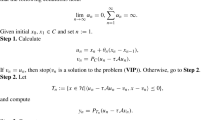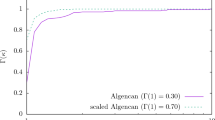Abstract
Lasserre’s hierarchy is a sequence of semidefinite relaxations for solving polynomial optimization problems globally. This paper studies the relationship between optimality conditions in nonlinear programming theory and finite convergence of Lasserre’s hierarchy. Our main results are: (i) Lasserre’s hierarchy has finite convergence when the constraint qualification, strict complementarity and second order sufficiency conditions hold at every global minimizer, under the standard archimedean condition; the proof uses a result of Marshall on boundary hessian conditions. (ii) These optimality conditions are all satisfied at every local minimizer if a finite set of polynomials, which are in the coefficients of input polynomials, do not vanish at the input data (i.e., they hold in a Zariski open set). This implies that, under archimedeanness, Lasserre’s hierarchy has finite convergence generically.
Similar content being viewed by others
References
Bertsekas, D.: Nonlinear Programming, 2nd edn. Athena Scientific, Belmont (1995)
Bochnak, J., Coste, M., Roy, M.-F.: Real Algebraic Geometry. Springer, New York (1998)
Cox, D., Little, J., O’Shea, D.: Ideals, Varieties, and Algorithms: An Introduction to Computational Algebraic Geometry and Commutative Algebra. Third edition. Undergraduate Texts in Mathematics. Springer, New York (1997)
Cox, D., Little, J., O’Shea, D.: Using Algebraic Geometry. Graduate Texts in Mathematics, vol. 185. Springer, New York (1998)
Gelfand, I., Kapranov, M., Zelevinsky, A.: Discriminants, resultants, and multidimensional determinants. Mathematics: Theory & Applications, Birkhäuser (1994)
Hartshorne, R.: Algebraic Geometry. Graduate Texts in Mathematics, vol. 52. Springer, New York (1977)
Henrion, D., Lasserre, J., Loefberg, J.: GloptiPoly 3: moments, optimization and semidefinite programming. http://homepages.laas.fr/henrion/software/gloptipoly3
Henrion, D., Lasserre, J.B.: GloptiPoly: global optimization over polynomials with Matlab and SeDuMi. ACM Trans. Math. Soft. 29, 165–194 (2003)
Henrion, D., Lasserre, J.B.: Detecting global optimality and extracting solutions in GloptiPoly. Positive polynomials in control. Lecture Notes in Control and Information Science, vol. 312, pp. 293–310, Springer, Berlin (2005)
Lasserre, J.B.: Global optimization with polynomials and the problem of moments. SIAM J. Optim. 11(3), 796–817 (2001)
Lasserre, J.B.: Moments, Positive Polynomials and Their Applications. Imperial College Press, London (2009)
Laurent, M.: Semidefinite representations for finite varieties. Math. Program. 109, 1–26 (2007)
Laurent, M.: Sums of squares, moment matrices and optimization over polynomials. In: Putinar, M., Sullivant, S. (eds.) Emerging Applications of Algebraic Geometry, vol. 149, pp. 157–270. Springer, Berlin (2009)
Marshall, M.: Representation of non-negative polynomials with finitely many zeros. Annales de la Faculte des Sciences Toulouse 15, 599–609 (2006)
Marshall, M.: Positive Polynomials and Sums of Squares Mathematical Surveys and Monographs, vol. 146. American Mathematical Society, Providence (2008)
Marshall, M.: Representation of non-negative polynomials, degree bounds and applications to optimization. Canad. J. Math. 61, 205–221 (2009)
Nie, J., Ranestad, K.: Algebraic degree of polynomial optimization. SIAM J. Optim. 20(1), 485–502 (2009)
Nie, J.: Discriminants and nonnegative polynomials. J. Symb. Comput. 47(2), 167–191 (2012)
Nie, J.: An exact Jacobian SDP relaxation for polynomial optimization. Math. Program. Ser. A 137, 225–255 (2013)
Nie, J.: Certifying convergence of Lasserre’s hierarchy via flat truncation. Mathematical Programming, to appear
Nie, J.: Polynomial optimization with real varieties. Preprint (2012)
Putinar, M.: Positive polynomials on compact semi-algebraic sets. Ind. Univ. Math. J. 42, 969–984 (1993)
Reznick, B.: Some Concrete Aspects of Hilbert’s 17th problem. In: Contemp. Math., vol. 253, pp. 251–272. American Mathematical Society, Providence (2000)
Scheiderer, C.: Non-existence of degree bounds for weighted sums of squares representations. J. Complex. 21, 823–844 (2005)
Scheiderer, C.: Distinguished representations of non-negative polynomials. J. Algebra 289, 558–573 (2005)
Scheiderer, C.: Sums of squares of regular functions on real algebraic varieties. Trans. Am. Math. Soc. 352, 1039–1069 (1999)
Scheiderer, C.: Positivity and sums of squares: a guide to recent results. In: Putinar, M., Sullivant, S. (eds.) Emerging Applications of Algebraic Geometry, in: IMA Volumes Math. Appl., vol. 149, pp. 271–324. Springer, New York (2009)
Sturmfels, B.: Solving Systems of Polynomial Equations. CBMS Regional Conference Series in Mathematics, vol. 97. American Mathematical Society, Providence (2002)
Acknowledgments
The author was partially supported by NSF grants DMS-0757212 and DMS-0844775. He would like very much to thank Murray Marshall for communications on the boundary hessian condition.
Author information
Authors and Affiliations
Corresponding author
Appendix: Non-identically vanishing of \(\fancyscript{R}\) and \(\fancyscript{D}\)
Appendix: Non-identically vanishing of \(\fancyscript{R}\) and \(\fancyscript{D}\)
Given any positive degrees \(d_0, d_1, \ldots , d_k, d_{k+1}\), we show that the polynomial \(\fancyscript{R}(p_0,\ldots ,p_k;q)\) defined in (4.6) and the polynomial \(\fancyscript{D}(p_0,p_1,\ldots ,p_k)\) defined in (4.11) do not vanish identically in \(p_i \in \mathbb R [x]_{d_i}\,(i=0,\ldots ,k)\) and \(q \in \mathbb R [x]_{d_{k+1}}\). Without loss of generality, we can assume all \(d_1, \ldots , d_k>1\) because linear constraints in (4.2) can be removed by eliminating variables.
First, we prove that the polynomial \(\fancyscript{R}\) defined in (4.6) does not vanish identically in the space \(\mathbb R [x]_{d_0} \times \cdots \times \mathbb R [x]_{d_k} \times \mathbb R [x]_{d_{k+1}}\). We only consider the case \(k<n\), because if \(k=n\) then \(\widetilde{p_1}(\tilde{x})=\cdots =\widetilde{p_k}(\tilde{x}) =\widetilde{q}(\tilde{x})\) has no nonzero complex solution in the generic case. By Proposition 4.1, it is enough to show that the homogeneous polynomial system (4.5) does not have a complex solution \(\tilde{x} \ne 0\) for generic \(p_0, p_1,\ldots , p_k, q\). We prove this in two cases:
-
(\(\mathbf x_0 \ne 0 \)) We can scale as \(x_0=1\), and the system (4.5) is then reduced to (4.4). When \(p_0, p_1,\ldots , p_k\) are generic, the set \(\mathcal{K }(p)\) defined in (4.3) is finite (cf. [17, Prop. 2.1]). Thus, when \(q\) is also generic, (4.4) does not have a solution in \(\mathbb C ^n\).
-
(\(\mathbf x_0 = 0 \)) The system (4.5) is then reduced to
$$\begin{aligned} \left\{ \begin{array}{c} \text{ rank }\left[ \nabla _x p_0^h(x) \nabla _x p_1^h (x) \cdots \nabla _x p_k^h(x)\right] \le k, \\ \quad p_1^h(x) = \cdots = p_k^h(x) = q^h(x) = 0. \end{array} \right. \end{aligned}$$(6.1)(Here, \(f^h\) denotes the homogeneous part of the highest degree for a polynomial \(f\).) When \(p_1,\ldots , p_k\) are generic, we have \(\varDelta (p_1^h,\ldots , p_k^h) \ne 0\). By definition of \(\varDelta \) (cf. §2.4), if \(p_1^h(x) = \cdots = p_k^h(x) =0\) and \(x \ne 0\), then
$$\begin{aligned} \text{ rank }\left[ \nabla _x p_1^h (x) \cdots \nabla _x p_k^h(x) \right] = k. \end{aligned}$$So, if \(x\) satisfies (6.1), there must exist scalars \(c_1,\ldots , c_k\) such that
$$\begin{aligned} \nabla _x p_0^h(x) = c_1 \nabla _x p_1^h (x) + \cdots + c_k \nabla _x p_k^h(x). \end{aligned}$$Since each \(p_i^h\) is a form, by Euler’s formula for homogeneous polynomials (cf. [18, §2]), we can get
$$\begin{aligned} d_0 p_0^h(x) = x^T \nabla _x p_0^h(x) =\sum \limits _{i=1}^k c_i x^T \nabla _x p_k^h(x) =\sum \limits _{i=1}^k c_i d_k p_k^h(x) = 0. \end{aligned}$$This means that (6.1) implies
$$\begin{aligned} p_0^h(x) = p_1^h(x) = \cdots = p_k^h(x) =0,\\ \text{ rank }\left[ \nabla _x p_0^h (x) \nabla _x p_1^h (x) \cdots \nabla _x p_k^h(x) \right] = k. \end{aligned}$$Any \(x\) satisfying the above must be zero if \(\varDelta (p_0^h, p_1^h,\ldots ,p_k^h) \ne 0\).
Combining the above two cases, we know the polynomial system (4.5) has no complex solution \(\tilde{x} \ne 0\) when \(p_0, p_1,\ldots , p_k,q\) are generic.
Second, we show that the polynomial \(\fancyscript{D}(p_0,p_1,\ldots ,p_k)\) defined in (4.11) does not identically vanish in the space \(\mathbb R [x]_{d_0} \times \mathbb R [x]_{d_1} \times \cdots \times \mathbb R [x]_{d_k}\). By Proposition 4.2, it is enough to prove that there exist \(p_i \in \mathbb R [x]_{d_i} \,(i=0,\ldots ,k)\) such that (4.10) has no complex solution \((\tilde{x},y)\) with \(\tilde{x}\ne 0, y\ne 0\). We prove this in two cases.
-
(\(\mathbf x_0 \ne 0 \)) We scale as \(x_0 = 1\), and (4.10) is then reduced to (4.9). Choose polynomials \(\hat{p}_i\) as follows:
$$\begin{aligned} \hat{p}_0:= f_0 \in \mathbb R [x_{k+1},\ldots ,x_n]_{d_0}, \, \hat{p}_1:=x_1^{d_1}-1, \ldots , \hat{p}_k:=x_k^{d_k}-1. \end{aligned}$$Clearly, on the variety \(V(\hat{p}_1,\ldots ,\hat{p}_k)\), the gradients \(\nabla _x \hat{p}_1,\ldots , \nabla _x \hat{p}_k\) are linearly independent, and so are
$$\begin{aligned} \left[ \begin{array}{l} \nabla _x \hat{p}_i \\ (\nabla _x^2 \hat{p}_i) y \\ \end{array}\right] , \left[ \begin{array}{l} 0 \\ \nabla _x \hat{p}_i \\ \end{array}\right] \quad (i=1,\ldots ,k). \end{aligned}$$Thus, (4.9) is equivalent to (4.8). If \((x,\lambda )\) is a critical pair, then \(\lambda _1 = \cdots = \lambda _k =0\) and \(D:=\text{ diag }(d_1x_1^{d_1-1}, \ldots ,d_kx_k^{d_k-1})\) is invertible. Denote \(x_{I}:=(x_1,\ldots ,x_k,)\) and \(x_{II}:=(x_{k+1},\ldots ,x_n)\). Note that (\(\hat{p}:=(\hat{p}_0,\ldots ,\hat{p}_k)\))
$$\begin{aligned} H_{\hat{p}}(x,0) = \left[ \begin{array}{c|c|c} 0 &{} 0 &{} D\\ \hline 0 &{} \nabla _{x_{II} }^2 f_0 &{} 0 \\ \hline D &{} 0 &{} 0 \end{array} \right] . \end{aligned}$$(In the above, the 0’s denote zero matrices of proper dimensions.) The matrix \(H_{\hat{p}}(x,0)\) is nonsingular if and only if \( \nabla _{x_{II} }^2 f_0 \) is nonsingular. Therefore, (4.8) has a solution if and only if there exists \(u \in \mathbb C ^{n-k}\) satisfying
$$\begin{aligned} \nabla _{x_{II}} f_0(u) =0, \quad \det \, \nabla _{x_{II}}^2 f_0(u) = 0. \end{aligned}$$However, the above is possible only if
$$\begin{aligned} \varDelta \left( \frac{\partial f_0}{\partial x_{k+1}}, \ldots , \frac{\partial f_0}{\partial x_{n}}\right) = 0. \end{aligned}$$So, if \(f_0\) is generic, then \(H_{\hat{p}}(x,0)\) is nonsingular for all \((x,\lambda )\) satisfying (4.2) corresponding to \(\hat{p}_0, \hat{p}_1, \ldots , \hat{p}_k\). By continuity of roots of polynomials, \(H_{p}(x,\lambda )\) is nonsingular for every pair \((x,\lambda )\) satisfying (4.2), if each \(p_i\) is generic and close enough to \(\hat{p_i}\).
-
(\(\mathbf x_0 = 0 \)) The polynomial system (4.10) is then reduced to
$$\begin{aligned} \left\{ \begin{array}{c} \text{ rank }\, Q(x,y) \le 2k, \quad p_1^h(x) = \cdots = p_k^h(x) = 0, \\ \big (\nabla _{x} p_1^h(x)\big )^Ty = \cdots = \big (\nabla _{x} p_1^h(x)\big )^Ty = 0. \end{array}\right. \end{aligned}$$(6.2)In the above, \(Q(x,y)\) denotes the matrix
$$\begin{aligned} \left[ \begin{array}{l} \nabla _{x} p_0^h \quad \cdots \quad \nabla _{x} p_k^h\\ \big (\nabla _{x}^2 p_0^h\big ) y \cdots \big (\nabla _{x}^2 p_k^h\big ) y \nabla _{x} p_1^h \quad \cdots \quad \nabla _{x} p_k^h \end{array}\right] . \end{aligned}$$We show that if \(p_0,p_1,\ldots ,p_k\) are generic, then (6.2) has no complex solution \((x,y)\) with \(x\ne 0, y\ne 0\). When all \(p_i\) are generic, for every \(x\ne 0\) satisfying
$$\begin{aligned} p_1^h(x) = \cdots = p_k^h(x) = 0, \end{aligned}$$the gradients \(\nabla _{x} p_1^h, \ldots , \nabla _{x} p_k^h \) are linearly independent. When \(\text{ rank }\, Q(x,y) \le 2k\), there exist scalars \(c_1, \ldots , c_k\) such that
$$\begin{aligned} \nabla _x p_0^h(x) - \sum \limits _{i=1}^k c_i \nabla _x p_i^h(x) = 0. \end{aligned}$$(6.3)By Euler’s formula for homogeneous polynomials, the above implies
$$\begin{aligned} d_0 p_0^h(x) = x^T \nabla _x p_0^h(x) = \sum \limits _{i=1}^k \lambda _i x^T \nabla _x p_i^h(x) = \sum \limits _{i=1}^k \lambda _i d_i p_i^h(x) = 0. \end{aligned}$$This means that if some \(x\ne 0\) satisfies (6.2) then the polynomial system
$$\begin{aligned} p_0^h(x) = p_1^h(x) = \cdots = p_k^h(x) = 0 \end{aligned}$$is singular. But this is impossible unless \(\varDelta (p_0^h, p_1^h,\ldots , p_k^h) = 0\).
Combining the above two cases, we know that there exist polynomials \(p_i \in \mathbb R [x]_{d_i}\,(i=0,\ldots ,k)\) such that there are no complex \(\tilde{x} \ne 0, y\ne 0\) satisfying (4.10). This shows that \(\fancyscript{D}(p_0,\ldots ,p_k)\) does not identically vanish.
Rights and permissions
About this article
Cite this article
Nie, J. Optimality conditions and finite convergence of Lasserre’s hierarchy. Math. Program. 146, 97–121 (2014). https://doi.org/10.1007/s10107-013-0680-x
Received:
Accepted:
Published:
Issue Date:
DOI: https://doi.org/10.1007/s10107-013-0680-x




